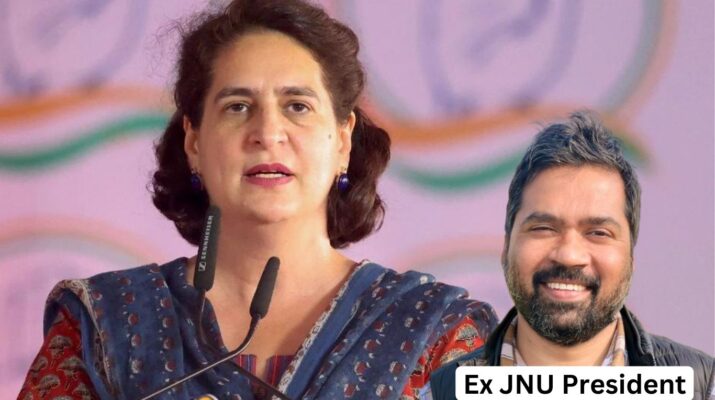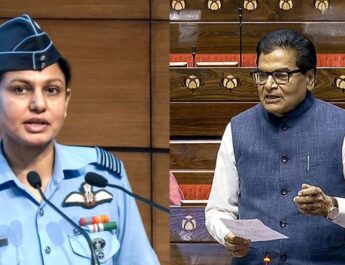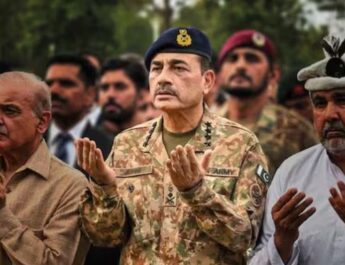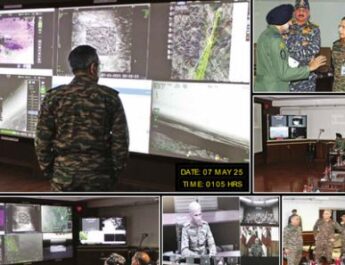Author: Sandeep Singh, EX. President JNU Students Union
Emotional Moment
A week has elapsed since then, yet during a gathering of ten, I find myself unexpectedly overcome with emotion. As I pen these words, I’m consciously evading the gazes of others within the party’s strategic chamber.
On that day, I encountered Priyanka ji on a street close to Fursatganj. She expressed a desire to talk about her father, Rajiv Gandhi. I agreed, anticipating a political discourse that would likely highlight Rajiv ji’s deep connection to Amethi. This was the final event of the day—the last address at 9 pm to the cadre of Amethi, following a series of fifteen public gatherings in Rae Bareli.
As with every major event, we navigated through the throng to reach the stage, swiftly dispensing with the welcome rituals. Our candidate, Kishori Lal Sharma, delivered a succinct address before Priyanka rose, microphone in hand. Initially, it was challenging for us to focus on her words; our attention was diverted by the need to initiate the live feed, adjust the camera angles, and ensure the stage’s stability—listening to the speech was out of the question.
Anxiety in the voice of a teenage girl
She had just begun speaking, and snippets of her narrative started to seep into my consciousness. Images of two children playfully misbehaving in their father Rajiv’s jeep, journeying through every village in Amethi, engaging with the locals, Rajiv ji’s rapport with the people, his compassion and bravery, the scarcity of resources, discussions about roadblocks, and references to the India Mark One hand pump—a faint picture began to take shape.
Then, abruptly, a sentence laden with the weight of the day’s fatigue pierced my ears like an arrow, rooting me to the spot. I could hear the anxiety in the voice of a teenage girl. It was a girl who was about to speak next; she had fasted for her father’s safety and spent her nights awaiting the sound of his late-night return, signaled by the familiar noise of his slippers.
Then, the sound of a ringing phone reached my ears, and as I gazed upon the silent assembly—in the midst of a profound tragedy as if unfolding in the present—my heart sank. A daughter was about to deliver the news of her father’s death to her mother. The clock on the screen was nearing ten o’clock, likely the same time as that fateful day. A nineteen-year-old girl had to inform a woman of the death of the man she loved, for whom she had left everything and crossed seven seas to be in India. A woman was about to inform another woman of the death of her husband, for whom she had embraced Indian culture and civilization as readily as the earth absorbs water. A teenage girl was approaching her mother’s room with the news of her father’s passing, and I could feel the heaviness of her steps on my shoulders.
Then, she spoke of a darkness that had settled in her mother’s eyes, and the entire gathering seemed to be enveloped in shadows. My eyes welled up with tears, and I couldn’t comprehend anything. I clenched my jaw, attempting to stem the tide within me. She was talking about the laughter that, after Rajiv Gandhi’s passing, she never saw again in the eyes of the woman she calls her mother. An image flashed in my mind, and as if propelled by some unseen force, I broke down in tears. To conceal my emotion, I stood behind one of my friends with my back turned. My body was shaking.
A torrent of tears flowed freely
Everything blurred before my eyes—meetings, politics, elections, and their associated stresses vanished. A torrent of tears flowed freely. An image emerged of a woman’s unwavering resolve, years of silence, to protect her husband’s nation from the rise of divisive forces. Then came the mention of her mother’s decision to contest elections from Amethi. Suddenly, a chant rose from the crowd, “Rajiv Bhaiya Amar Rahe” (Long Live Brother Rajiv), and the entire assembly seemed to awaken from a slumber. My reverie was shattered. I looked around slowly. Young men were weeping. The women at the front were crying. The elders were in tears. Hundreds of people around me were shedding tears. Some folks from my village were present too. I didn’t want anyone to see me cry, but it was futile.
I envisioned a daughter sitting with the ashes of her martyred father on a train from Delhi to Prayagraj, witnessing the mountain of sorrow and anger within her, melting away in the warmth of thousands of people’s tears at Amethi’s railway station. That night at Amethi’s station, where my first journeys in life began, I saw a girl in a sea of tears discovering the essence of life, family, and the genuine love and respect a leader receives from the people. I couldn’t have been more than eight or nine years old at the time, nor was I physically there, but it felt as if it were all unfolding before my eyes. Amidst the surging crowd, a girl was finding the strength to combat her solitude.
A farmer’s home was consumed by the flames of a fire, a common occurrence during the summer. Clutched in his hand were the ashes of partially burnt currency notes he had saved for his daughter’s wedding. When she saw Ramakanti from Jamo town standing before the crowd, tears streaming down her face, she began to share her story. Holding back her own tears, she said, “Don’t cry, you are very brave; your courage has given me strength.” She beckoned Ramakanti to join her on the stage and softly chanted, “Rajiv Bhaiya ki Bitiya” (Daughter of Rajiv Bhaiya). The girl, carrying a lantern and receiving the blessings of the waiting elders, stepped forward, administering eye medicine to children alongside her mother, and a family distributing widow pensions. She continued to recount the tale of love, truth, service, and devotion to the people of Amethi.
Following this, the daughter presented to all of us a treasure she had kept tucked in her pallu. The entire gathering was illuminated by the gem’s radiance. A sacred bond was once again forming with its own aura. She said, “If there was one person in my life whom I revered, it was my father. Amethi is where my father worked. I venerate this land as well. This land is sacred to me. This land is sacred to Rahul.”
Priyanka Gandhi delivered an extensive speech. It became challenging to discern who was speaking. Differentiating between the two roles—daughter or public leader—became difficult.
Priyanka Gandhi’s address in Amethi, akin to Ravana wielding immense power and wealth, halting the BJP’s electoral chariot with her brother’s support, stands as the most heartfelt and potent speech of her career to date. This oration will be etched in the collective memory of the people for generations. The ethical appeal and the reverberation of a fresh determination, conveyed by a daughter and a leader to their sisters and brothers in Amethi, have taken root in everyone’s consciousness. The lament of a daughter and the summons of a public leader are coursing through Amethi today like bolts of lightning.
(The author has served as the President of the JNU Students Union. He can be reached at @KaunSandeep.)




